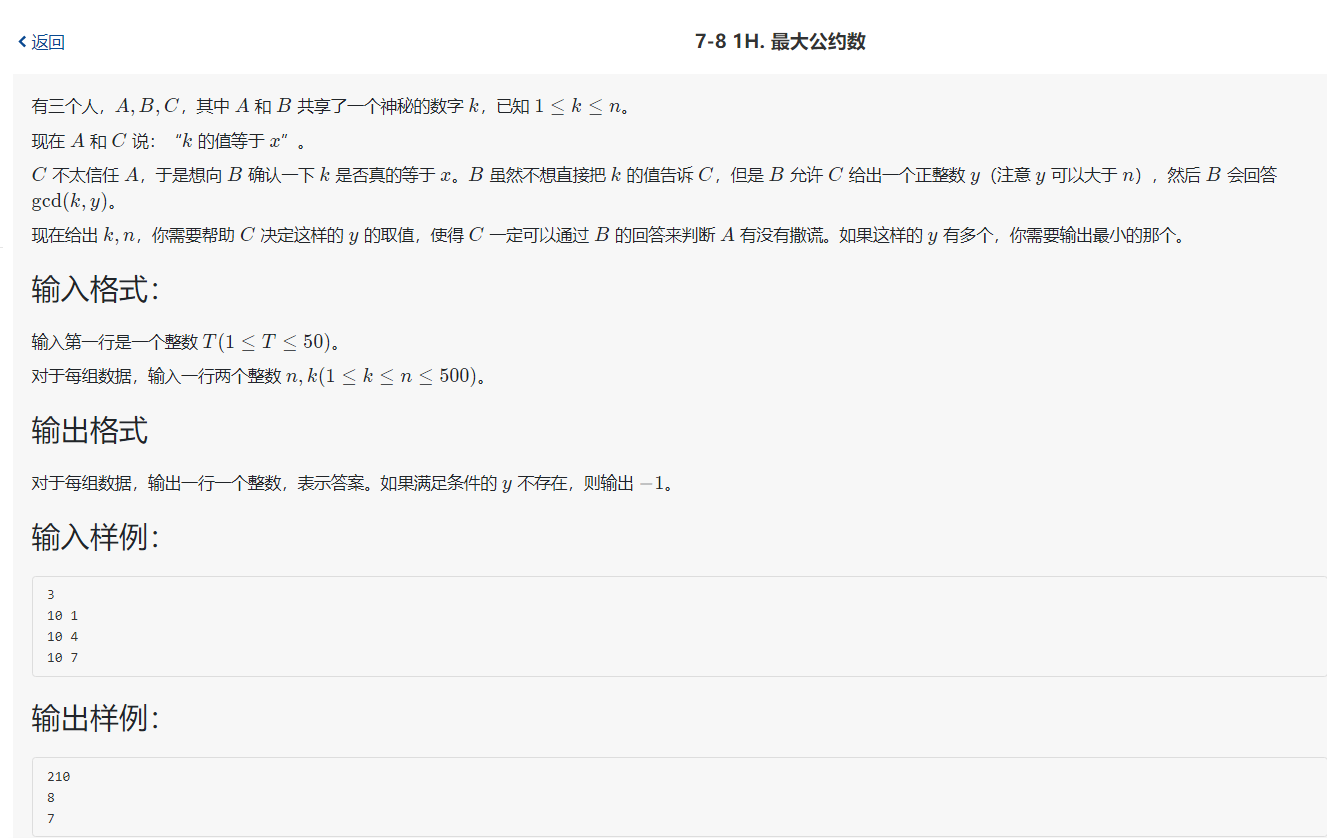2020 CCPC Wannafly Winter Camp Day1H
Article Directory
subject
7-8 1H. Maximum common divisor
There are three people, A,B,C, in which A and B share a mysterious number k, known as 1 < K < n.
Now A and C say, "The value of k equals x."
C doesn't trust A very much, so I want to check with B if K really equals x.B does not want to tell C the value of K directly, but B allows C to give a positive integer y (note that y can be greater than n), and B will answer gcd(k,y).
Now, given k,n, you need to help C determine such a y value so that C must be able to tell whether A is lying by B's answer.If you have more than one y like this, you need to output the smallest one.
Input format:
The first line of input is an integer T(1 < T < 50).
For each set of data, enter a row of two integers n,k(1 < k < n < 500).
Output Format
For each set of data, the output is an integer in a row representing the answer.If y does not exist, the output_1.
Input sample:
3
10 1
10 4
10 7
Output sample:
210
8
7
thinking
At first my idea was, since I want to tell if this number is true or false, then I want to make sure that the Y I give makes gcd (k,y) unique i n 1-N and gcd(i, y) (1<=i<=n), so I can tell that if gcd (k,y) is unique, then x equals K. If it is not unique, X does not equal k, so just let gcd(i, y) be unique.(k,y) is unique. How can we be unique? Let y be a multiple of k, btw. First, explain why the 101 answer of Sample 1 is 210. First, we need a y so that gcd (1, 210) is unique in 1-10. Then multiply the prime numbers in 1-10 so that gcd (i, 210) (2<=i<=10) cannot be 1.So we just need to figure out how many times K are in 1-n, so we can turn the problem into 1, 2, 3...Make gcd (1, y) unique in n/k, that is, multiply the prime number of 1-n/k, and then multiply K. Multiply large numbers when out of range.
Code
#include <iostream> #include <cstdio> #include <set> #include <list> #include <vector> #include <stack> #include <queue> #include <map> #include <string> #include <sstream> #include <algorithm> #include <cstring> #include <cstdlib> #include <cctype> #include <cmath> #include <fstream> #include <iomanip> using namespace std; #define dbg(x) cerr << #x " = " << x <<endl; typedef pair<int, int> P; typedef long long ll; const int MAXN = 1000; int prime[MAXN]; int tot = 0; bool is[MAXN]; void init() { memset(is, 1, sizeof(is)); is[0] = is[1] = 0; for(int i = 2; i < MAXN; i++) { if(is[i]) { prime[tot++] = i; } for(int j = 0; j < tot; j++) { if(prime[j] * i >= MAXN) break; is[i * prime[j]] = 0; if(i % prime[j] == 0) break; } } } struct BigInt { const static int mod = 10000; const static int DLEN = 4; int a[600], len; BigInt() { memset(a, 0, sizeof(a)); len = 1; } BigInt(int v) { memset(a, 0, sizeof(a)); len = 0; do { a[len++] = v % mod; v/=mod; }while(v); } BigInt operator *(const BigInt &b)const { BigInt res; for(int i = 0; i < len; i++) { int up = 0; for(int j = 0; j < b.len; j++) { int temp = a[i]*b.a[j] + res.a[i+j] + up; res.a[i+j] = temp % mod; up = temp / mod; } if(up != 0) { res.a[i+b.len] = up; } } res.len = len + b.len; while(res.a[res.len-1] == 0 && res.len > 1) res.len--; return res; } void output() { printf("%d", a[len-1]); for(int i = len-2; i >= 0; i--) { printf("%04d", a[i]); } printf("\n"); } }; int main() { int t, n, k; init(); scanf("%d", &t); while(t--) { scanf("%d%d", &n, &k); int l, r; l = 1; r = n/k; BigInt ans(1); for(int i = l; i <= r; i++) { if(is[i]) { BigInt tmp(i); ans = ans * tmp; } } BigInt temp(k); ans = ans * temp; ans.output(); } return 0; }
